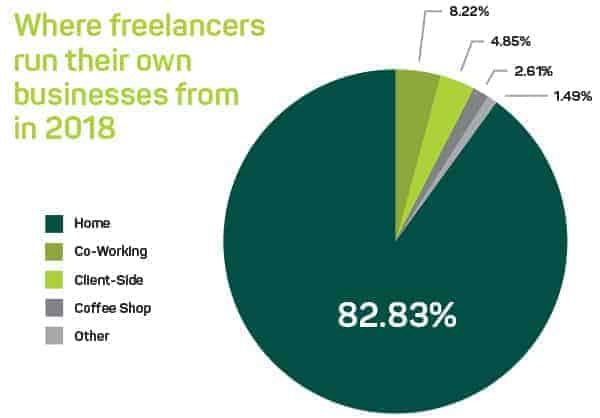
The Rise And Rise Of Co-Working
Posted on 28th August 2018 by Phil Ainley
Co-working continues to grow in popularity with freelancers across the UK
Co-working has seen a boom in recent years, with many freelancers and micro-businesses opting-to work in communal spaces.
Recent research undertaken by Cushman & Wakefield has shown that serviced offices and co-working providers have topped London leasing tables for the first time.
The company also found that approximately two thirds of the UK flexible workplace market is located outside of the capital.
Further research, by Instant Offices (https://www.instantoffices.com/blog/reports-and-research/uk-market-summary-2018/), estimates almost 5% of the UK’s total office stock being made up of flexible working spaces.
The rise of self-employment from the global financial crisis is now widely accepted as a permanent fixture in the UK economy and shows no signs of slowing down, with self-employment growing by a quarter since 2009!
The growth of the freelance sector is credited with being a key driver in the rise of co-working and collaborative working spaces.
Providers including: Ziferblat, WeWork, Headspace Group, Workplace, Accelerate Places, Bruntwood and sites within the Greater Manchester universities have all helped put the Manchester freelance scene firmly on the map.
A more comprehensive list of co-working spaces can be found here.

Many freelancers work in collaboration with like-minded business they meet in co-working environments.
Teaming-up with like-minded businesses
Aside from the obvious cost-savings on offer from sharing working space, co-working environments offer many benefits for added value services that businesses can pass on to their clients.
Co-working provides easy opportunities for like-minded businesses to team-up on various projects. This is prevalent in the creative media industry sector with, for example: marketers teaming with creative designers and copywriters, and animators working with video/film companies.
Working together and referring work to each other develops trust and helps ensure these micro businesses continue to thrive.
One of the lesser acknowledged advantages of utilizing the facilities of a co-working space rather than working from home, is that physically travelling to your work space triggers a ‘work mode’ mentality. Whereas, staying at home to work can trigger laziness and a temptation to lounge while watching daytime tv.
Home comforts are still the biggest draw
However, it’s going to take time before co-working really becomes ingrained in the freelancer psyche. Recent stats from @FHChat showed that freelancers still preferred their home comforts to any other work space available to them.

There are any number of reasons for this, but results from Google Search indicate the key reason is cost. It’s always going to be far cheaper to work from home than to rent co-working space.
If you are a home worker, you could ask yourself a few questions.
- How much do I spend on marketing?
- Am I getting enough work?
- Could I handle more work?
- Would I like to earn more?
The cost of renting co-working space could be offset by the increase in work you gain. It could also reduce the need to spend your hard-earned cash on marketing and advertising, as you can become a part of the referring network that co-workers tend to develop.
Here are 10 key benefits of co-working at a glance:
- Easier to expand your business network.
- Enhanced productivity through being surrounded by busy, hard-working individuals rather than being isolated in a room on your own.
- Increased sense of community.
- Quality location to meet and present to clients.
- Increased chance of new opportunities for collaborative work and referrals.
- Potential to reduce overheads.
- Freedom to move to a new location if wanted.
- Decreased feeling of isolation.
- Travelling to your co-working space triggers ‘work mode’
- Increased social circle and social opportunities.
Whether you’re already co-working, or if you’re thinking about giving it a try. It is easy to see there are benefits to be gained from it. It’s not for everyone, but whatever you decide, we wish you the best of luck in your ventures.
Don’t forget, as a freelancer or self-employed person it’s a good idea to be insured, especially if you are co-working with other people. Professional Indemnity and Public Liability Insurances can be purchased combined and the policies can be tailored to your needs.
Call our award-winning team on 0333 321 1403 to discuss the options available to you.
Related Articles:
Essential co-working space etiquette
The rise and rise of co-working
Are co-working spaces right for your freelancing career
Making the most of co-working communities
The best co-working spaces in Manchester
Three alternatives to working from your kitchen table


